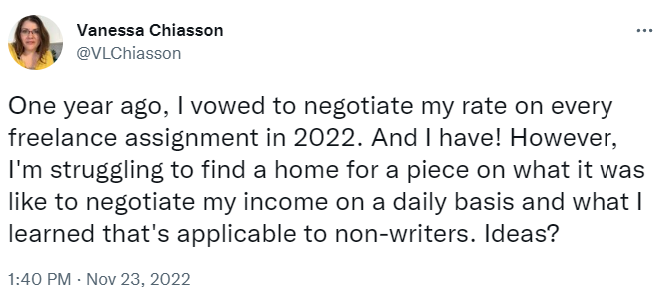In 2022 I negotiated my rate on every freelance assignment. Here’s what happened
This essay is written by Vanessa Chiasson, a freelance writer based in Ottawa who specializes in travel and human interest stories. She challenged herself to negotiate her rate on every assignment in 2022. Here is part one of two on her results.

Many people go their entire life without ever asking for a raise. In 2022, I did it every day.
Or, very nearly so. As a freelance writer, I diligently keep an eye on my bottom line. I know much of my success doesn’t come from my brilliant ideas but from my ability to manage my business as, well, a business. In the face of an increasingly uncertain economy, I knew if I wanted to thrive, I’d have to ask some hard questions, starting with one that most people dread: Is that the best you can do? It’s a query I raised with editors for a year now.
I was motivated to tackle my rates in part by the hosts of The Writer’s Co-op Podcast, Wudan Yan and Jenni Gritters. Yan and Gritters steadily encourage writers to value their work and their personal time, to raise their rates and negotiate assignment fees instead of simply taking on additional work. Their insights felt both audacious and bewitchingly simple. Could I really do that? Just…ask for more money?
As it turns out, I could negotiate for more money, and I’m not alone in doing so.
Freelancer Pamela MacNaughton said, “I have always been a people pleaser, so negotiating rates has been a challenge. The pandemic changed that, in the sense that I’m no longer willing to sacrifice myself or my worth.” Meanwhile, writer Jill Schildhouse reported that negotiating, “Adds up if you keep doing it…. Just ask…. The worst thing they can say is no.”
I vowed to ask my assigning editors for more than the offered fee, no matter how big or small the piece. However, the idea of negotiating anything, let alone everything, is a misery to me. I’m a big ol’ scaredy cat. I knew I needed a way to stay accountable to myself when my courage waned and decided I’d track my endeavour on a spreadsheet.
My efforts were soon rewarded. My very first negotiation earned me an extra $50. Since then, a whopping 68% of my assignments have benefited from my willingness to ask for more. In doing so, my confidence has soared and not just because of the positive responses.
Editors who said no were often my biggest cheerleaders, encouraging me to keep asking and regretting that they weren’t in a position to increase rates. Tom Firth, Managing Editor of Culinaire, was one such champion. I asked him what motivated him to give such a supportive “no” and he said, “I completely understand getting asked if there is more budget for something…it’s not something that I ‘like’ being asked generally, since I rarely have a favourable answer, but it does keep us thinking about our rates. I never mind being asked, and firmly believe that if I am being asked politely or openly about the budget for an article, then I certainly can reply in much the same fashion.”
Overall, I can’t say that I ever got especially comfortable asking for more money but it no longer feels intimidating. It’s simply another good freelance business practice, right up there with tracking receipts. I’m tremendously proud of my efforts and my success rate. However, when I did my final financial calculations, my income revealed some hard truths I wasn’t expecting. Stay tuned for what I learned about money and publishing in my next instalment.




